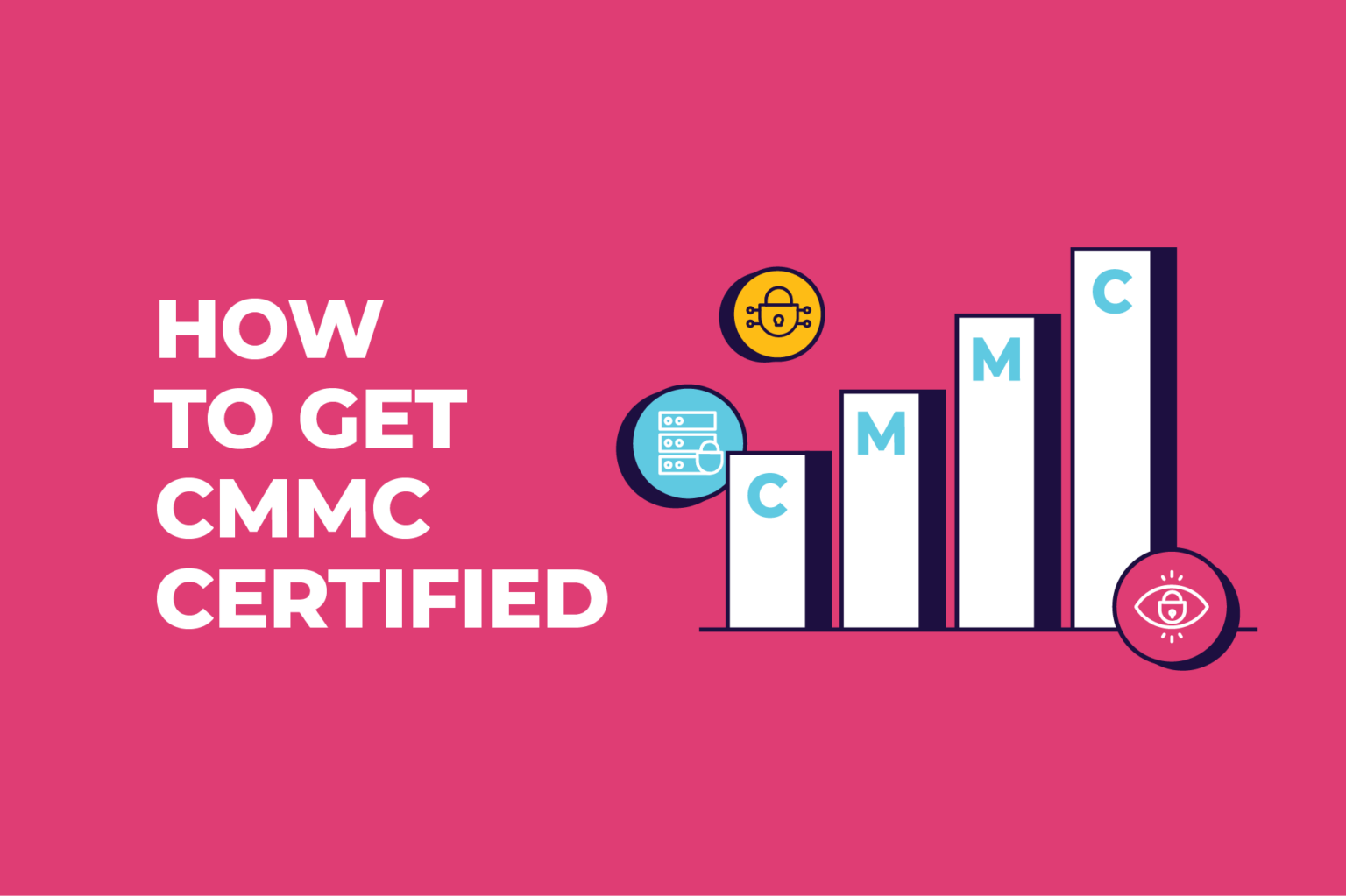If your company handles sensitive government data and/or your customers are part of the U.S. Department of Defense (DoD)’s supply chain and you have access to their data, you will require CMMC – the Cybersecurity Maturity Model Certification.
This quick guide breaks down the steps so you can protect sensitive data while keeping your business running smoothly. We’ll cover the CMMC model levels, the certification process, and tips for choosing a partner in getting you CMMC certified.
You’ll learn key factors in determining your CMMC level, building a System Security Plan, and picking a certified third-party assessment organization (C3PAO) to conduct your assessment.
With the right prep, you can tackle CMMC without major disruptions. Let’s dive in!
What is CMMC Certification?
CMMC certification stands for Cybersecurity Maturity Model Certification. It’s a certification developed by the U.S. DoD to help protect sensitive information related to Federal Contract Information (FCI) and Controlled Unclassified Information (CUl) within the defense industrial base.
CMMC Maturity Levels
The CMMC framework defines three levels of cybersecurity maturity, from basic hygiene (Level 1) to advanced (Level 3). Each level builds on the previous level and consists of practices and processes to achieve a higher degree of cybersecurity maturity. The specific level of CMMC certification required depends on the sensitivity of the data and systems to which a company needs access.
Why is CMMC Important?
The DoD created the CMMC framework to help ensure that any company handling FCI or CUl implements adequate security controls and processes to protect sensitive data. Achieving CMMC certification demonstrates to the DoD that your company has an acceptable level of cybersecurity maturity and can be trusted to handle sensitive government data.
How to Achieve CMMC Certification
Achieving CMMC Certification Involves Several Steps:
- Determine your target CMMC level. The DoD will specify the required level for companies handling FCI and CUI.
- Assess your current cybersecurity maturity against the CMMC model. Identify any gaps that need to be addressed to meet your target level.
- Develop and implement a plan to close any gaps and meet the required practices and processes for your target level. This may involve policy changes, infrastructure changes, training, etc.
- Have an independent CMMC Third Party Assessment Organization (C3PAO). Conduct an assessment of your cybersecurity maturity. The C3PAO will review documentation and conduct interviews to verify you meet the required CMMC level.
- Obtain certification at your target CMMC level from the CMMC Accreditation Body (AB). Certification is good for 3 years, after which re-certification is required.
Achieving CMMC certification will likely take 6-18 months for most companies depending on their current maturity level and the CMMC level they need to achieve. But maintaining certification and strong cybersecurity controls provides significant benefits, allowing continued work on sensitive DoD programs.
The Importance of CMMC Certification
As a DoD contractor, CMMC certification is crucial to your business. The CMMC aims to ensure all DoD contractors implement appropriate cybersecurity controls and best practices to safeguard sensitive data.
Achieving CMMC certification demonstrates your commitment to cybersecurity and allows you to continue working with the DoD.
Meet DoD Cybersecurity Requirements
The DoD released CMMC to standardize cybersecurity across the defense industrial base. All companies that work with the DoD, including contractors and subcontractors, must achieve a CMMC certification level based on the sensitivity of the data you handle. Certification confirms you have implemented controls to properly secure FCI and CUI.
Gain a Competitive Advantage
With CMMC, the DoD seeks to partner only with organizations that make cybersecurity a priority. By achieving certification, you show the DoD your organization is a trusted and secure partner. This can open up more opportunities to win new contracts and maintain existing work. On the other hand, failure to achieve the required CMMC level risks losing access to DoD contracts.
Protect Sensitive Data
The security controls required for CMMC certification help ensure sensitive government data is protected. Requirements include limiting system access, using multi-factor authentication, encrypting data, training employees on cyber risks, and more. Implementing these best practices significantly reduces the risk of a data breach, protecting both government data as well as your own intellectual property and customer information.
In summary, CMMC certification demonstrates your commitment to cybersecurity, allows you to work with the DoD, helps win new contracts, and protects sensitive data.
While the certification process requires time and resources, the benefits to your business and national security far outweigh the costs. Achieving and maintaining the appropriate CMMC level should be a priority for any DoD contractor.
CMMC Levels and Their Requirements Explained
The CMMC model consists of three levels of cybersecurity maturity, from Level 1 up to Level 3. Each level requires compliance with a specified set of cybersecurity standards and processes to achieve certification.
Level 1: Basic Cyber Hygiene
At Level 1, organizations need to perform basic cyber hygiene and ensure that Federal Contract Information (FCI) is protected. This includes activities like limiting access to FCI to authorized users only and providing security awareness training to personnel.
Although level 1 organizations are expected to perform these basic cybersecurity practices, there will be no third-party certification assessment. Instead, level 1 organizations are expected to conduct annual self-assessments, accompanied by an affirmation from a senior company official to confirm that the company is adhering to relevant requirements.
Level 2: Advanced Cyber Hygiene
Level 2 requires organizations to document and implement basic controls to protect CUI. Additional requirements at this level include conducting vulnerability scans, and maintaining an inventory of hardware and software assets. Organizations must also develop system security plans, and implement risk management and cyber incident response plans.
In the event of critical CUI data, organizations must pass a high-level third-party assessment every three years. In contrast, non-prioritized assets with data not essential to national security are required to conduct annual self-assessments.
Level 3: Expert Cyber Hygiene
Level 3 requires organizations to demonstrate advanced protection of CUI through auditing and penetration testing, advanced access controls, and CUI flow mapping. At Level 3, organizations implement the most stringent controls to thwart advanced persistent threats, including deceptive controls and insider threat analysis.
To achieve CMMC certification, organizations will need to engage an independent third-party commercial certification body to assess their compliance with the CMMC practices and processes required for their target level. The certification body will review documentation and possibly conduct site visits to verify the implementation of controls before issuing an official CMMC certificate.
The CMMC Certification Process
To achieve CMMC certification, you’ll need to follow the official process established by the CMMC Accreditation Body. The first step is to determine your CMMC maturity level, which ranges from Level 1 to Level 3, based on your company’s needs. Next, you’ll choose a CMMC Third Party Assessor Organization (C3PAO) to guide you through the certification process.
Review CMMC Requirements
Work with your C3PAO to review the requirements for your target CMMC level. They will evaluate your current cybersecurity practices and controls to identify any gaps that need to be addressed to meet the standards. You’ll develop a plan and timeline for implementing necessary improvements to policies, procedures, and technical controls.
Conduct a Self-Assessment
Once ready, conduct an internal self-assessment to evaluate how well your enhanced controls and processes meet the CMMC guidelines. The C3PAO will review the results to verify you’re prepared for the official certification assessment.
Schedule the On-Site Assessment
If the self-assessment is successful, schedule the on-site CMMC certification assessment with your C3PAO. They will send accredited assessors to review documentation and conduct interviews to evaluate if your controls satisfy the requirements for your target level. Any identified deficiencies must be remediated before certification can proceed.
Achieve Certification
After remediating any assessment findings, your organization will be officially certified at your target CMMC level. Certification is valid for 3 years, after which you must undergo recertification to maintain your status. Achieving and maintaining CMMC certification demonstrates to customers and partners your strong commitment to cybersecurity and protection of sensitive data.
To sum up, following the step-by step process set out by the CMMC Accreditation Body and working closely with your C3PAO will help guide you through achieving certification. With hard work and persistence, your organization can reach its target CMMC maturity level and reap the benefits of certification.

How Much Does CMMC Certification Cost?
Obtaining CMMC certification isn’t free, so you’ll need to budget for the associated costs. The total cost will depend on your company’s size, complexity, certification level and assessment type. According to estimates, small businesses with under 50 employees can expect to pay a couple of thousand US dollars, while mid-size companies of 50 to 500 employees could pay hundreds of thousands, mostly dependent on the CMMC certification level.
Assessments and Audits
The bulk of the cost comes from hiring an accredited C3PAO (CMMC Third Party Assessment Organization) to assess your systems and processes, then conduct an onsite audit. C3PAOs charge by the hour, with rates varying per hour per auditing firm.
A small company may require 200-500 hours of assessment and audit work, while a large enterprise could need 1,000 hours or more.
Remediation and Improvements
You’ll also need to budget for any remediation and system improvements required to meet CMMC standards. This can include things like:
- Upgrading firewalls, antivirus software, and other cybersecurity tools.
- Implementing multi-factor authentication for all logins.
- Developing new policies, procedures, and documentation for your cybersecurity practices.
- Providing additional employee training on security awareness and best practices.
The costs here will depend on your current cybersecurity posture and how much needs to be done to achieve your target CMMC level. It’s best to have a third-party assessor evaluate your systems upfront so you can develop an accurate budget.
Maintenance
Don’t forget that CMMC certification must be maintained annually through surveillance audits and re-assessments. Plan on paying a percentage of your initial assessment and audit fees each year to remain certified. C3PAOs may also charge for any remediation services needed to correct findings from your audits.
While expensive, CMMC certification provides many benefits like improving your cybersecurity, gaining more government contracts, and giving your customers peace of mind. With a well-developed plan, the cost of certification can absolutely be worth the investment in the long run.
GET COMPLIANT 90% FASTER WITH AUTOMATION
How Scytale Can Help
In wrapping up, it’s obvious that achieving and maintaining CMMC compliance is crucial for organizations, especially those working with the Department of Defense. Yet, it’s not just about understanding the compliance levels or the DoD’s requirements; it’s about implementing them effectively to safeguard vital data and propel business growth.
Enter Scytale – our team of CMMC experts and easy-to-use tech can get you CMMC certified without the headaches. We’ve spared teams countless hours of tedious tasks and confusion. Gone are the days of endless back-and-forth communication with auditors and manual workloads. With Scytale, achieving compliance is not only attainable but also efficient and hassle-free.
At Scytale, we understand that compliance shouldn’t be a drain on your resources or a distraction from your core business objectives. That’s why we’re committed to providing our customers with the tools and support they need to secure their CMMC without sacrificing time, patience, or focus. With Scytale by your side, you can navigate the certification with confidence, knowing that your data is protected.










